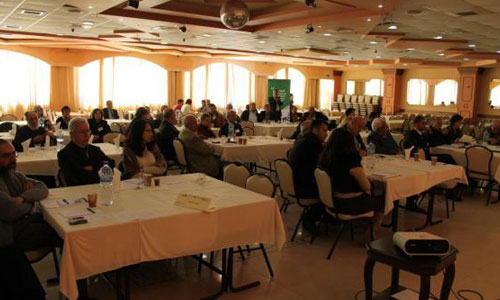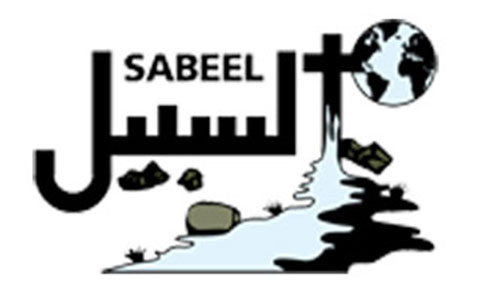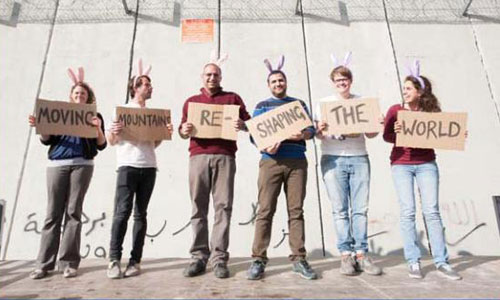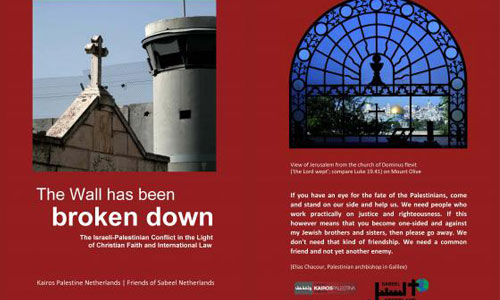
Al-Liqa’ Center and Sabeel Center
Organized a Conference on
“Peaceful Resistance in Palestine”
20 April 2013
Golden Park Hotel – Beit Sahour
The political and racial injustices perpetrated by the Israeli Occupation of Palestine harm and oppress all Palestinians with no distinction between Muslim and Christian. The threats posed to our communities belong to all of us, as we share both land and daily lives together. Sabeel and Al-Liqa’ seek to build upon and strengthen already existing relationships of trust and mutual respect between individuals and faith communities. The Sabeel Center and Al-Liqa’ Center recently co-organized a one-day conference to address peaceful, nonviolent resistance in the context of Palestine, looking at theologies and Biblical and Quranic texts that support a shared value of nonviolence.
Speakers from both Sabeel and Al-Liqa’ introduced the day’s topic, stressing that our shared belief in peaceful resistance signifies strength; it is not a result of weakness or fear of the Israeli occupiers. We share a strong belief in the justice of the Palestinian cause, and we put forth a word of truth to both Israeli and international societies, without distorting our message with violence. Our sole demand is to live in dignity and liberty in a Palestinian state and on Palestinian soil with Arab East Jerusalem as its capital; this includes, of course, the desire to live in peace with the Israelis.
The conference consisted of a total of seven lectures, and each presentation was followed by an enriching question and answer session. Both lunch and dinner were provided for participants.
The first lecture was provided by His Beatitude Patriarch Emeritus Michel Sabbah, who spoke on the Palestinian Christian view of peaceful resistance. Patriarch Sabbah addressed the multi-faceted nature of peaceful resistance, which involves issues such as peace, violence, war, terrorism, and the various religious points of view on war and peace. Patriarch Sabbah mentioned that humanity has thus far failed in getting rid of weapons, armies, and mutual fear. His Beatitude said that the mission of religion is to direct people in the way of truth and righteousness, not to kill in the name of God. He mentioned that Holy Scripture and revelation call us to peace and love. In essence, resistance should be against evil and sin. Finally, the Patriarch suggested several books that speak about Palestinian resistance from a Christian point of view.**
The second lecture was given by Sheikh Zuheir Al-Daba’i on “The Palestinian Islamic View of Peaceful Resistance”. He pointed out that armed resistance, which generations of our people espoused, led to negative results. Instead, non-violent resistance, which many generations also practiced, led to our steadfastness. This is the strongest reply to the Zionist Israeli occupation.
Mr. Ziad ‘Izzat followed with a lecture on “Courage in Non-Violence.” Mr. ‘Izzat examined “courage” through both the cultural and philosophical legacy of the word, looking at both ancient and modern ideas that involved both violence and non-violence. He offered a comparison between violence and non-violence, and emphasized that courage cannot be equated with violence, unless violence is used to bring about good.
Ms. Ta’yeed Al-Daba’i presented the fourth lecture, which gave a comparative analysis of the First Intifada (in Arabic, “The Uprising of the Stone”, which was considered largely nonviolent) and the Second Intifada (in Arabic, “The Al-Aqsa Uprising”, which was considerably more violent). In comparing the two, Ms. Ta’yeed stressed the positive results of nonviolence during the Uprising of the Stone, while pointing out the negative results of the more violent Al-Aqsa Uprising.
Ms. Al-Daba’i’s lecture was followed by a panel comprised of three speakers: Ms Raja’ Abu Rahmeh from Bil’in, Ms. Manal Al-Tamimi from Al-Nabi Saleh, and Fr. Dr. Ibrahim Shomali from Beit Jala. Each panellist spoke about weekly non-violent activities in his or her area, which are being carried out in response to the separation wall and other Israeli colonial activities and policies.
Dr. Mazin Qumsiyeh gave the sixth lecture on models of peaceful resistance in Palestine and how to transform these models into a nationalist movement. Interestingly, he added that public opinion polls clearly indicate that the majority of Palestinians support all kinds of resistance – not merely armed or merely peaceful resistance. This should be taken into account as non-violent activists strategize about resistance.
The study day concluded with a final lecture by Dr. Sami Al-Kilani on the strategy of peaceful resistance in Palestine. He spoke of factors hampering or reinforcing non-violence in Palestinian society. For example, violence against women reinforces violent thought in society. Dr. Al-Kilani emphasized that popular beliefs are the fertile ground in which violence prospers; we must take them into account as we cultivate peaceful thought and plan strategic nonviolent resistance.
The proceedings of the conference are available in both Arabic and English.
**For further reading on these topics, check out the following resources:
Rev. Dr. Naim Ateek, Justice and Only Justice and A Palestinian Cry for Reconciliation, Sabeel Center.
Dr. Geries S. Khoury, The Intifada of Heaven and the Intifada of Earth, Al-Liqa’ Center.
Rev. Dr. Mitri Raheb, I am a Palestinian Christian, The Evangelical Lutheran Christmas Church.
“Kairos Palestine – A Moment of Truth,” www.kairospalestine.ps.
We want to express our heartfelt thanks to all who took part in the planning and successful execution of this conference: to our eloquent lecturers and panel members listed above, to our hosts and moderators (Dr. Geries S. Khoury of Al-Liqa’, Attorney Jonathan Kuttab of Sabeel, Mr. Mousa Darwish of Al-Liqa’, Mrs. Haneen Abu Sa’da, Mrs. Hanadi Soudah Younan, Dr. Adnan Musallam of Al-Liqa’, Dr. Jeanne Kattan, and Ms. Hind Khoury); to the conference organizers, to our participants from the Bethlehem Governorate; and to all our honoured guests from Bethlehem, Nablus, Hebron, Jerusalem, Ramallah, and the Galilee.





